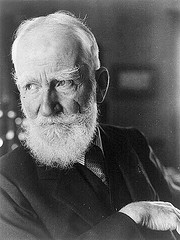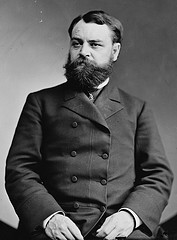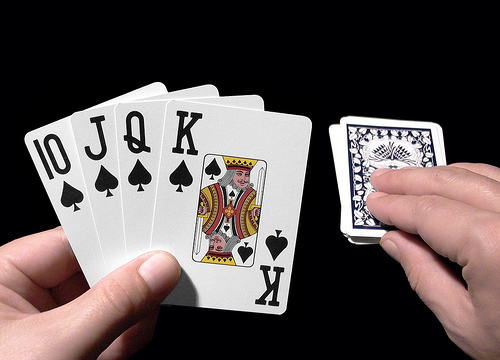93 + 13 + 93 = 1459
13 + 43 + 53 + 93 = 919
Overruled

A razor company once invited George Bernard Shaw to shave his famous beard. He responded with a postcard:
Gentlemen:
I shall never shave, for the same reason that I started a beard, and for the reason my father started his. I remember standing at his side, when I was five, while he was shaving for the last time. “Father,” I asked, “Why do you shave?” He stood there for a full minute and finally looked down at me. “Why the hell do I?” he said.
— GBS
“Strange Instance of Sympathy”
The Duke de Saint Simon mentions in his ‘Memoirs’ a singular instance of constitutional sympathy between two brothers. These were twins — the President de Banquemore and the Governor de Bergues, who were surprisingly alike, not only in their persons, but in their feelings. One morning, he tells us, when the president was at his royal audience, he was suddenly attacked by an intense pain in the thigh; at the same instant, as it was discovered afterwards, his brother, who was with the army, received a severe wound from a sword on the same leg, and precisely the same part of the leg.
— Frank H. Stauffer, The Queer, the Quaint and the Quizzical, 1882
Clinician, Heal Thyself
In The Elements of Style, his popular guide for writers, William Strunk declares:
“The subject of a sentence and the principal verb should not, as a rule, be separated by a phrase or clause that can be transferred to the beginning.”
Unwelcome Coincidence

Abraham Lincoln’s son Robert seemed to carry an odd curse — he was present or nearby at three successive presidential assassinations:
- On April 14, 1865, his parents invited him to accompany them to Ford’s Theater. He remained at the White House and heard of his father’s death near midnight.
- On July 2, 1881, he was an eyewitness to Garfield’s assassination at Washington’s Sixth Street Train Station.
- On Sept. 6, 1901, he was present at the Pan-American Exposition in Buffalo, N.Y., when McKinley was shot.
In 1863, a stranger saved his life in a Jersey City train station. The stranger was Edwin Booth — the brother of John Wilkes Booth, his father’s future assassin.
In a Word
leint
v. to add urine to ale to make it stronger
Honeymoon
In October 1928, newlyweds Glen and Bessie Hyde set out to run the rapids of the Colorado River through the Grand Canyon. They didn’t reappear by December, and a search plane spotted their scow adrift on the river, upright, intact, and loaded with supplies. No one knows what became of them.
How to Win Six Million Dollars

Summon six millionaires and invite them to stake their fortunes on a single hand of poker. They will eagerly agree. Open a new deck of cards, discard the jokers, and ask the millionaires to cut (but not shuffle!) the deck as many times as they like. Then deal seven hands, ostentatiously dealing your own second and fourth cards from the bottom of the deck.
The millionaires may be reluctant to object to this, as all six of them will be holding full houses. (This works — try it.) But “See here,” they will finally say. “What was that business with the bottom-dealing? You’re up to something. We insist that you discard that hand.” Look hurt, then deal yourself a new hand.
You’ll likely be holding a straight flush.
Showoff

English mathematician John Wallis (1616-1703) had an odd way of passing time:
“I note that on 22 December, 1669, he, when in bed, occupied himself in finding (mentally) the integral part of the square root of 3 × 1040; and several hours afterwards wrote down the result from memory. This fact having attracted notice, two months later he was challenged to extract the square root of a number of fifty-three digits; this he performed mentally, and a month later he dictated the answer, which he had not meantime committed to writing.”
— W.W. Rouse Ball, Mathematical Recreations & Essays, 1892
Less Is More
Mark Twain once received this telegram from a publisher:
NEED 2-PAGE SHORT STORY TWO DAYS.
He responded:
NO CAN DO 2 PAGES TWO DAYS. CAN DO 30 PAGES 2 DAYS. NEED 30 DAYS TO DO 2 PAGES.
